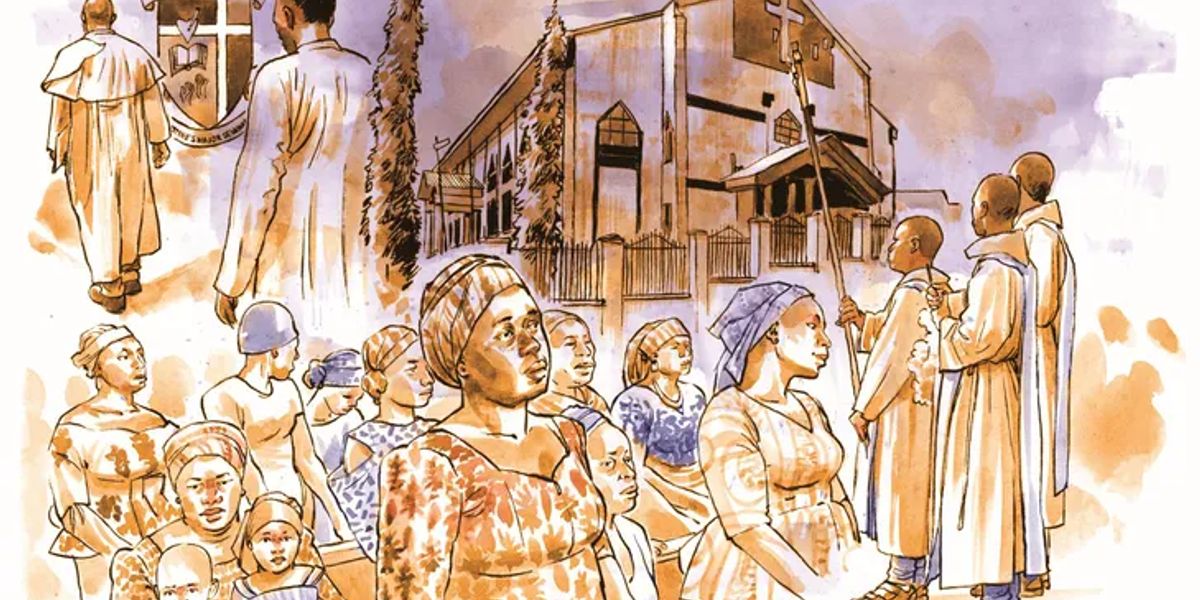Akeelah Jr. Framinchi is getting impatient. “Come quickly. The Mass starts in a few minutes!” At 24 years old, the young man appointed himself as the guide for this brief stay in Jos, in the Plateau State in central Nigeria. He quickly slips on a pair of black Converse All-Stars and rushes through his neighborhood’s maze of stone houses. He weaves through the homes and navigates between ancient cars and swarms of motorcycle taxis.
On the opposite sidewalk, Saint Louis Church is bursting at the seams this Thursday evening in April. “Here, it’s like this: people are very religious, so you have to come early,” he gently chides. Nigeria, along with Kenya, has the highest attendance of Catholics at Mass in Africa. Only a bench behind a pillar at the back of the building is left. No matter, it will do. The many pious latecomers will remain standing on either side of the nave, backs to the sun. Half the congregation is composed of children. The church benefits from the country’s demographic boom: from 219 million inhabitants in 2021, Nigeria could become the third most populous country in the world in 20 years, with 350 to 400 million inhabitants.
A dynamic church
The procession advances to the rhythm of percussion and lively songs, leaving no room for silence. Yet, the liturgy maintains a certain solemnity: communion is taken kneeling at benches around the altar, and the choir sings some hymns in Latin. During the homily, Akeelah frenetically types on his phone to transcribe the priest’s words. This blend speaks volumes about this young church, heir to the Catholic tradition but rooted in its African cultural soil.
According to estimates, the number of Catholics ranges between 20 and 30 million, representing 10 to 15% of the population. Without a census, precise statistics are impossible to establish. The region of Jos is predominantly Christian; the diocese estimates that 30% of the population are faithful Catholics. Their numbers continue to grow yearly, as in many African countries: the continent leads in the number of faithful worldwide.
After the Mass, Emmanuel Duru Ifeangi, one of the few parishioners who swapped traditional attire for a football jersey, steps forward, welcomes, and gauges his interlocutor’s first impressions. For a French person who grew up in a secular society, such religious practice can only be surprising. Pleased with the effect, the 30-something youth worker believes that the “zeal” of Nigerian Catholics can “inspire the whole world.”
Beside him, a nun added, “Even Pope Francis says that Africa is the future of the church!” The phrase, initially uttered by St. John Paul II, is repeated by the faithful of Jos, who firmly believe in an African rise in the universal church. When noting the number of children of all ages present in the church, the response is swift: “We do not let them drift away from faith as they grow up,” Emmanuel Duru Ifeangi replied with pride. “Whether through theater clubs, youth nights, or various workshops, our programs accompany them up to questions about vocation.”
Vocations ‘boom’
Vocations? They are perhaps the most tangible sign of the dynamism of this young church. The next day, we head to Saint Augustine’s major seminary, one of Nigeria’s 16 diocesan seminaries. A seminarian leads us to the administration offices. “Don Giuseppe? Don Giuseppe?” he said, calling for his supervisor. The use of Italian to find Father Joseph Gotus, the vice-rector, is no stylistic choice. It reflects the Vatican language in which some church leaders are addressed, admiring the Curia’s verticality and organization. “The Vatican likes Nigeria because we are more Roman than the Romans,” a priest later confided. Father Gotus, stocky, with one blind eye, heavily drops into his chair. In front of him are piles of blue papers—the words “Subject: bioethics” can be deciphered in black ink.
“Come, I’ll show you around,” the supervisor said. The outside atmosphere is strangely calm; the heat accentuates the impression of stillness. But when he opens the auditorium door, one immediately understands why Africa can afford to send reinforcements to the Old Continent. In this vast room, dozens of seminarians sit in neat rows, listening distractedly to a lecturer. Gathered together, they give the impression of a regiment in a barrack. “There are 354 students here, about 50 of whom could be ordained this summer,” Father Gotus said, amused by this demonstration of strength. “In your country, there are fewer and fewer priests, but here, we cannot even ordain them all!” Due to lack of space, resources, and needs. According to annual data published by Rome, Africa is the only continent recording a steady and significant increase in vocations.
Walking on, Father Gotus celebrated the “boom” of vocations across the country. Then he added, “Perhaps the stability of the priesthood attracts some young men in our harsh economic and security context.” He himself was incredulous upon learning that 88 priests were ordained last year in France. “In your entire country? That’s equivalent to one of our seminaries in some years!” he exclaimed, astonished. His figures would indeed be dizzying to his French counterparts. Nigerian inter-diocesan seminaries, like the one in Jos, all host “at least 200 students.”
Missionaries for a de-Christianized West
The seminarians are aware that they represent the demographic future of global Catholicism, and pride is visible on their faces. Do they desire to fly to Europe? Emmanuel Echo, 32, takes a moment to reflect. “Faith came to us from the West and is spreading rapidly here, while it fades in Europe and America. It is our mission to be sent there to revive it,” he said. He echoed a prevailing discourse, internalized from the seminary, which now positions African priests as the missionaries of the 21st century. Even if some African dioceses are reluctant to call on Nigerian priests, citing training deficiencies.
How do these faithful explain their growth while Catholicism declines across the Mediterranean? I left Jos and my friend Akeelah for Abuja, the capital, at the invitation of the National Association of Theologians. In a room at the episcopal conference offices, about 30 theologians, priests, catechists, and a few nuns pause their discussions to answer some questions, intrigued by the presence of a French journalist. Their questions reflect their image of a decadent West, which they feel compelled to re-Christianize. “Is it true that your churches are being turned into mosques?” asked Sister Chibugo, a Nigerian Daughters of Divine Love congregation nun.
“Here, we transmit faith because we teach doctrine,” added the nun confidently, doubting the response she received and praising the local dynamics. Around her, heads nod in agreement with this simple yet effective explanation. “We offer the world the simplicity of faith,” said Father Victor Jamahh Usman from the Minna diocese (northwest of Abuja). “You (the West) have overthought and over-theorized, making faith complex for people. We say God created things as they are, and we should not question them.” This anti-intellectualism is surprising coming from the crème de la crème of theologians. In their determination to counter a declining European church in societies whose morals they disapprove of, does their perspective prevent them from reflecting on their own issues, such as training quality or clericalism? These issues, like priestly celibacy or the role of women, are still largely ignored and unaddressed.
The time for an African pope?
Growth of the faithful, explosion of vocations: by the numbers, Nigeria undeniably contributes to evangelization. But is the country sufficiently recognized within the whole church? Is it mature enough to address these challenges? On the steps of Kubwa church, a few kilometers from the capital, the faithful reverently jostle to shake hands with Archbishop Ignatius Kaigama of Abuja, there to celebrate the confirmation of 274 children. Around the building, armed civilians ensure security. Clergy are regularly kidnapped in Nigeria, especially in the northern parts of the country, by terrorist groups or criminal organizations.
After the Mass, which lasted nearly four hours, Archbishop Kaigama takes the seat of honor, surrounded by city notables, a gesture of both hospitality and recognition of his authority in the community. Is his country, evangelized in the late 19th century, sufficiently represented in the hierarchy of the universal church in his view? In the case of a conclave, Nigeria currently has only one cardinal elector. For the archbishop, there is no need to rush. “We are still too young as Christians to assume significant responsibility,” he tempered. “We have the vigor of youth but not the ecclesial wisdom and culture.” Similarly, he continued, the time is not right for an African pope, with opinions too strong to “preserve the unity of the Catholic Church” amid contrary tendencies, especially on sexual morality issues.
This immaturity is reflected, in his view, by a confusion between the Catholic hierarchy and a political organization. He shows messages from a faithful member on his phone. Hospitalized, this person sent the bishop his bank details. “People still see the church as a government that can give them money,” he lamented. “They do not fully understand its role.” This misunderstanding of the Catholic organization slightly worried him. Taking advantage of the country’s impoverishment, Pentecostal churches have been attracting more Catholics for three decades with an unrestrained discourse on enrichment. “It is not a competition between Christians,” he assured, “but people are leaving.” In Nigeria, behind the seemingly irresistible growth, is Catholicism beginning to lose ground to this new generation of evangelical churches?
A minority of Nigerian Catholics
The majority of Nigerians are Sunni Muslims. Islam, the religion of about 55% of the country’s inhabitants, is mainly established in the northern half.
Sharia is enforced in a dozen states in this federal country. Hisbah, an Islamic police force, ensured its application in several cities.
Christians form nearly 43% of the population, of whom over 60% are evangelical Protestants. According to estimates, Catholics and Anglicans each makeup about 20% of Nigerian Christians.
A tiny minority of Nigerians adhere to traditional African religions: fetishism, animism, etc. There are also beliefs unique to Nigeria, such as the Yoruba religion, specific to the eponymous people predominantly in the west of the country, which was exported to the Caribbean and Louisiana with the slave trade in various forms of voodoo.
Chrislam, a syncretic religion blending Christianity and Islam, has also developed in the Yoruba nation in the southwest.
—
‘We know the risks…’ Vocations unaffected by persecutions
The Catholic clergy – like Protestant pastors – face regular persecution in Nigeria. In 2023, nearly 30 priests were kidnapped across the country, mainly in the northern areas where jihadist groups operate, demanding ransom for their release. “We are targets, but that does not scare us,” assured a seminarian from the Jos diocese. “We know the risks; we are ready to give our lives and fulfill the church’s mission.” Dioceses now refuse to pay for priests’ release, some of whom are still missing. “Bishops remain firm, but the financial burden of the ransom falls on families,” added the same seminarian. According to a ranking by the evangelical NGO Open Doors, Nigeria is the sixth most dangerous country for Christians in the world.







